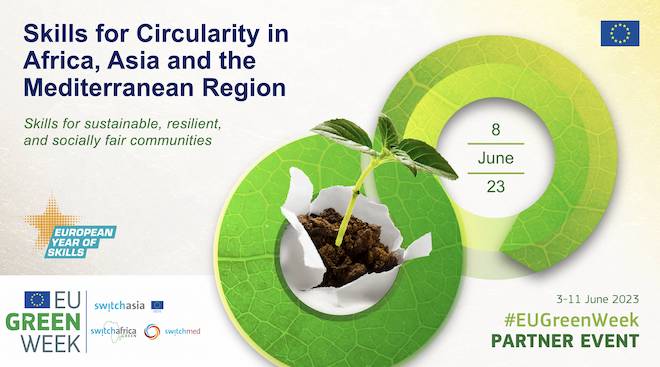Skills for Circularity in Europe, Asia, Africa and the Mediterranean
Organizers: EU Green Week
Date and time

Through the EU Green Deal and Global Gateway, the European Union is committed to supporting the transition of countries to a low-carbon, resource-efficient, and circular economy, while promoting sustainable production and consumption patterns within Asia, the Middle East, the Pacific, Africa, and the Mediterranean, and greener supply chains between these regions and Europe. This has been possible through programs, such as SWITCH-to-Green (EU global flagship initiative on green economy), SWITCH-Asia, SWITCH-Med and SWITCH-Africa Green.
These programs contribute actively to the 2030 Agenda for Sustainable Development, in particular Goal 12 on Responsible Consumption and Production, as well as mainstreaming the external dimension of key EU policies and strategies such as the Circular Economy Action Plan, the Farm to Fork Strategy, the EU Textiles Strategy, among others. They place emphasis on sharing capacities in the field of sustainable consumption and production in Asia, Africa, and the Mediterranean.
The increasing importance of the circular economy will have a significant impact on the shape of jobs and competencies. New skills will become more prominent such as digital and green literacy and problem solving, while skills related to specific functionalities or disciplines will continue to be important. Non-repetitive, circular jobs will emphasize skills such as product repair and maintenance or innovating the product design process to improve longevity. Circular mindsets and skills must be addressed directly in the classroom, and this requires an investment in resources such as suitable training equipment, teacher training, resource libraries, and more.
The forum will answer the following questions:
- How will the shift to a circular economy affect skills in each continent? Which skills will be most needed?
- How do we teach circular skills? What are the specificities in teaching circular skills in each region?
- How can skills be shared across continents? Which best practices can be shared from each continent? How would sharing of skills contribute to increased resilience of value chains?
Event objectives
- Increased understanding of the scale of change in skills required but also the existing resources and best practices available for a shift to a circular economy.
- Exchange of views about the changes in teaching methods needed for each region to shift to a circular economy.
- Overview of practical examples of companies and entrepreneurs to support a shift to a circular economy in each region.
Speakers
- Cesare Onestini, Director-General for LIFE (Agriculture, Fisheries, Social Affairs, and Health), General Secretariat of the Council of the European Union
- Nurzat Abdyrasulova, Founder and General Director, Unison Group

